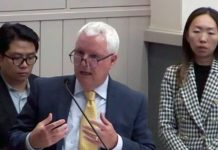
As the City moves in fits and starts to acquire the 20 unoccupied single family houses Caltrans offered to sell it under 2021’s Senate Bill 381, opponents have put increasing pressure on the city council to abandon the plan.
SB 381 is the city-sponsored bill aimed at greasing the City’s ability to acquire dozens of the mismanaged properties in town that Caltrans acquired decades ago for its now-abandoned SR-710 extension project.
Meantime during a closed session Wednesday, the city formally authorized hiring Akin Gump attorney Dario Frommer as a special legal counsel to advise on and finalize a draft settlement in the City’s legal battle to undue what it sees as Caltrans’ improper decision to bypass the City’s offer on behalf of tenants to purchase the 12-unit multifamily structure at 626 Prospect. Caltrans instead offered the property to Friendship Pasadena Baptist Church. The City won an injunction against the sale last year, but a hearing on the merits is still pending. The special counsel was recommended by the South Pasadena Preservation Foundation (SPPF), which also submitted the draft settlement.
Four ex-mayors–Robert Joe, Richard Schneider, Odom Stamps and Harry Knapp—told the City it should retain “special counsel” to push the deal through under the terms originally proposed by the 626 Prospect residents and their consultant, Heritage Housing Partners.
“We are going to voluntary mediation,” Council Member Jon Primuth told the South Pasadenan News. He also left open the possibility that the settlement will encompass not only 626 Prospect, but a final disposition on the city’s acquisition of the 20 vacant properties Caltrans has offered to sell to the city. He said he could not elaborate, but that “we are exploring the path recommended to us by SPPF and all the public commenters.”
During the past two city council sessions, over two dozen citizens have expressed strong opposition to what they say is the City’s plan to acquire and then place the 20 properties under the auspices of a housing-related entity, which they worry may not have the City’s interests at heart. Most advocate instead for a plan submitted by SPPF.
Under its plan, SPPF says the properties would be sold to private owners through “double escrows,” generate $20 million that could be used to develop affordable housing, and produce $65,000 a year by placing the properties back on city tax rolls. They argue their plan would also speed resolution of, and spare the city costs associated with, the ongoing problem of squatters occupying some of the properties.
“It would ensure that the City maintains control over how those properties are used and maintained, thus allowing the City to protect and preserve the character of the city,” Doug Watkins and Julie Stern, who have owned a home next door to one of the Caltrans properties for over 25 years, wrote in comments filed Oct. 5.
“The South Pasadena City Council has a real opportunity to work through a complex set of circumstances and achieve a relatively smooth, cost-efficient and home-grown outcome to repairing the neighborhood fabric of our small city,” wrote SPPF’s Mark Gallatin.
Double Escrow Dispute
Reportedly, the City and Caltrans have resisted the SPPF plan because they do not regard the use of double escrows as a viable legal option. But Gallatin told the City that in fact, Caltrans has previously endorsed the use of double escrows by HREs for occupied properties, and if is “good enough for an HRE to use, can you explain why it is not good enough for the City to use?”
He and other commenters also point to the deal the City struck in 2001 for a Caltrans property at 2002 Berkshire which was sold through a three-part transaction to a private owner that did not seem to raise a problem for Caltrans.
A double escrow could be used under both the SPPF and SB 381 approaches, Primuth told the South Pasadenan News. Although there has been a “lively” discussion about this over the past year with SPPF, Primuth said he still believes it presents “significant legal problems.” The City would have to be persuaded a double escrow would work before it would present such a plan to Caltrans, he said.
Primuth said he and the City have spent many hours talking and engaging with folks over these and related questions, but acknowledged many citizens and especially SPPF members still think the council is “either out of touch or making a mistake or doesn’t understand what it’s doing. Hopefully we have won a little respect for the process we are going through, but I still have concerns” about the path SPPF is advocating.
Moreover, settlements in the case have fallen through before. In July last year the City, acting on behalf of 626 Prospect tenants who wanted to purchase their units at an affordable price, convinced a judge to issue an injunction against the sale to Friendship Pasadena pending a hearing on the merits of the city’s case.
A hearing was set for June 28, 2022. But as the date approached, two events spooked the city. First, on March 23 2022, an appeals court reversed a trial court ruling that Caltrans won in the Flores case, a separate lawsuit brought by Caltrans tenants in El Sereno. Then on April 7, Caltrans adopted a set of “emergency” rules pursuant to SB 381. Reportedly concerned these events undermined its position in the 626 Prospect case, the City on April 13 announced it made a settlement offer to Caltrans.
Worried the City felt threatened by a provision Caltrans had slipped into the emergency regulations meant to sabotage the 626 Prospect lawsuit, the Flores renters and SPPF implored the council not to settle. Instead, they said the City could still win the case and use it to leverage for a “global” settlement that would include a deal on the sale of all Caltrans properties within the 710 corridor.
Persuaded, the council on May 25 voted in closed session to rescind the settlement, much to the chagrin of Caltrans. A hearing on the City’s request for an order abrogating the sale to Friendship Pasadena is now set for Jan. 24.
Litigation Loose Ends
In the meantime, the parties filed a joint status statement on the 626 case. The City said it would resist any move to dissolve the injunction it won against the sale to Friendship Pasadena, while Caltrans said it was “disappointed” that the City rescinded its April settlement offer and called for hearings on whether the injunction should be dissolved and whether the City should be ordered to amend its complaint in light of the Flores decision. Friendship Pasadena argued the city “lack(ed) good cause for reneging” on the April settlement and that case should be dismissed. Heritage Housing Partners argued the issues raised by the City have not been mooted and that its right to acquire the property remains enforceable.
HHP also agreed with the Flores renters that Caltrans’ SB 381 emergency rules included a provision to sabotage the lawsuit. HHP was scheduled to file a cross complaint in the case, but its attorney, Dan Shapiro, told the South Pasadenan News this week it no longer plans to file the motion because HHP and the city—nominally allies in the case–“have not been able to coordinate their respective litigation strategies.” He did not elaborate.
As for Flores, the case was remanded to the trial court for proceedings in light of the appeal court’s decision favoring the tenants right to purchase their homes for Caltrans’ original acquisition cost not adjusted for inflation. Counsel in that case conferred on Sept. 6 but the parties “did not agree on either what the appellate court meant or how to resolve the case,” Flores attorney Chris Sutton wrote Oct 12. He has asked the court for a hearing to issue a judgment and potentially for additional hearings “on the scope of remedies.” The court this week set a briefing schedule and a hearing date for Jan. 25, 2023. He noted that will be after the effective date for two new bills, SB 512 and SB 959, both of which he said buttress the Flores renter’s position.




















.png)







